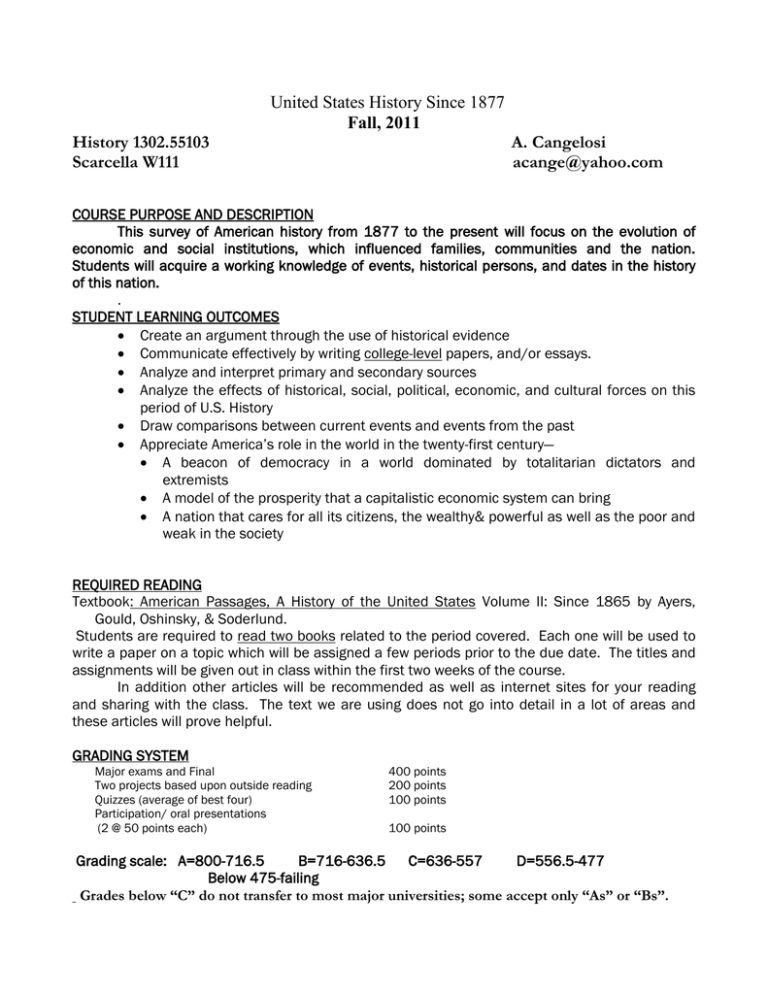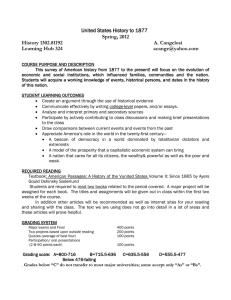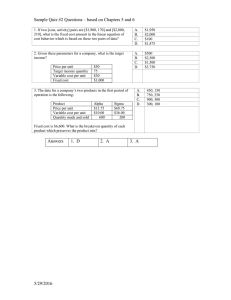Fall 1302 syllabus 55103.doc
advertisement

United States History Since 1877 Fall, 2011 History 1302.55103 Scarcella W111 A. Cangelosi acange@yahoo.com COURSE PURPOSE AND DESCRIPTION This survey of American history from 1877 to the present will focus on the evolution of economic and social institutions, which influenced families, communities and the nation. Students will acquire a working knowledge of events, historical persons, and dates in the history of this nation. . STUDENT LEARNING OUTCOMES Create an argument through the use of historical evidence Communicate effectively by writing college-level papers, and/or essays. Analyze and interpret primary and secondary sources Analyze the effects of historical, social, political, economic, and cultural forces on this period of U.S. History Draw comparisons between current events and events from the past Appreciate America’s role in the world in the twenty-first century— A beacon of democracy in a world dominated by totalitarian dictators and extremists A model of the prosperity that a capitalistic economic system can bring A nation that cares for all its citizens, the wealthy& powerful as well as the poor and weak in the society REQUIRED READING Textbook: American Passages, A History of the United States Volume II: Since 1865 by Ayers, Gould, Oshinsky, & Soderlund. Students are required to read two books related to the period covered. Each one will be used to write a paper on a topic which will be assigned a few periods prior to the due date. The titles and assignments will be given out in class within the first two weeks of the course. In addition other articles will be recommended as well as internet sites for your reading and sharing with the class. The text we are using does not go into detail in a lot of areas and these articles will prove helpful. GRADING SYSTEM Major exams and Final Two projects based upon outside reading Quizzes (average of best four) Participation/ oral presentations (2 @ 50 points each) 400 points 200 points 100 points 100 points Grading scale: A=800-716.5 B=716-636.5 C=636-557 D=556.5-477 Below 475-failing Grades below “C” do not transfer to most major universities; some accept only “As” or “Bs”. EXAMS AND QUIZZES Exam format: multiple choice and essay questions Minor quizzes will be given at instructor’s discretion Although this is a lecture course, each student is expected to be prepared to contribute to class discussion and make at least two presentations to the class. These presentations will be taken from the text book and other research. The presentations will vary in length depending upon the topic and the number of students in the class. Extra Credit: None offered! There is too much to do to make time for extra work . ATTENDANCE You must sign in at the beginning of each class period to be counted present. Class will begin promptly, so students should make a special effort to be on time. Arriving late is very disruptive and inconsiderate of both the instructor and the class. Leaving class early is totally unacceptable. Should tardiness or leaving class early become a problem for the class, there will be consequences to the offending student’s final grade. If you can’t meet the class on a regular basis in a timely fashion, then maybe taking the class is inappropriate for you Students are responsible for any and everything missed due to absence from class Students will be expected to treat members of the class as they, themselves, would wish to be treated. Please turn off all pagers and cell phones upon entering the classroom. Make up work. Students are encouraged to make every effort to take exams and submit papers at the scheduled times. Anyone missing an exam is expected to come prepared to make up at the next class. Absence is not an excuse for turning papers in late. If you can not attend class, plan to e-mail the assignment to the instructor on the due date. Late work will not be accepted unless there is some very significant reason why the student was unable to submit the work at he designated time. H.C.C.’s stated attendance policy is after missing six hours from a course you can be administratively withdrawn. This means after missing three (3) classes you may be dropped. It is the student’s responsibility to withdraw from the course. If you stop attending and do not complete the proper withdrawal forms, you will receive a grade based upon the marks you earned while attending. Students who miss the first two days of class will automatically dropped by the computer. ____________is the deadline for dropping the course with a W. All students who must complete 12 hours per semester to maintain their status should assess their grade at this point EGLS3 -- Evaluation for Greater Learning Student Survey System At Houston Community College, professors believe that thoughtful student feedback is necessary to improve teaching and learning. During a designated time, you will be asked to answer a short online survey of research-based questions related to instruction. The anonymous results of the survey will be made available to your professors and division chairs for continual improvement of instruction. Look for the survey as part of the Houston Community College Student System online near the end of the term STUDENT CODE OF CONDUCT Plagiarism, cheating and other forms of academic dishonesty are prohibited by College System policy and the rules of this class. Plagiarism is the use of the ideas or words of another person (either in whole or in part) without crediting the source. Plagiarism is the theft of another person’s work and its appropriation as one’s own. Cheating involves fraud and deception for the purpose of violating legitimate testing rules. Cheating includes, but is not limited to, copying from another student’s test paper; using, during a test materials not authorized by the person giving the test; collaborating with another student during a test; knowingly using, buying, selling, etc. whole or part of an unadministered test. Any questions about academic dishonesty should be referred to the Student Conduct section of the College System catalog. Please note that Cheating in any form will result in a failing grade for the course. This policy will be enforced for all examinations and written assignments. Disability Statement; Any student with a documented disability (e.g. physical, learning, psychiatric, vision, hearing, etc.) who needs to arrange reasonable accommodations must contact Disability Services Office (Dr. Becky Hauri) at the beginning of each semester. Faculty is authorized to provide only the accommodations requested by the Disability Services Office COURSE OUTLINE Unit I the Gilded Age 1877-1890 Chapters 17, 18, 19 through page 496 Class I Industrialization (432-440) Workers Organize (441-445) (471-473) Class 2 Urbanization,& Immigration, Diminishing Rights (460-471) Class 3 Class 4 Politics in the Gilded Age (456-458,481-483) Agrarian Revolt (452-453) Problems of agriculture Angry Farmers (477-483) Bryan & 1896 Election (498-500) Unit II Reform & Expansion Chapters 19 (pages 497 forward), 20, 21 Class 5 American Expansion (474-476) (497-503) Class 6 Progressive Reform Quiz 2 TR, Taft & Wilson’s reforms Quiz I Unit III The United States in The Great War Chapter 22 Class 7 Class 8 the Great War and Woodrow Wilson Wilson Negotiates a Peace –His greatest failure Versailles Treaty Wilson wins the Nobel Prize Senate rejection of the Treaty Class 9 TEST I CHAPTERS 17-22 Unit IV the Twenties and Thirties Chapters 23, 24, 25 Class 10 American Society in the Twenties Cultural conflicts Revolution in Manners and Morals Class 11 Restoration of Political Conservatism Conservative Presidential Administration in the Twenties Class 12 Hoover Vs FDR on the Great Depression (26) Quiz 3 Class 13 New Deal & Political Realignment Unit V World War II Chapter 25 (page 674—676), 26 Class 14 Road to World War II U.S Response to aggression Pearl Harbor and U.S. response Class 15 Home Front Wartime Diplomacy and Cooperation Class 16 the U.S.A. in World War II Quiz 4 Military Strategy Class 17 Test II chapters 23-26 Unit VI the Cold War at Home and Abroad Chapters 27, 28, 29 Class 18 Post war Domestic issues Truman & Eisenhower Class 19 The Cold War Creation of New Foreign Policy Quiz 5 Class 20 Liberalism’s Last Hurrah! New Frontier Idealism (761-774) Great Society Activism (776-785) American Society since World War II Unit VII the 1970s to A New Century Chapters 30, 31, 32 Class 21 Nixon elected President in 1968 (787-792) Class 22 Nixon Foreign Policy (785-799) (807-809) Class 23 The Cold War’s last gasp: Vietnam and the Chaos of 1968 Quiz 6 Class 24 Watergate & its aftermath (812 Class 25 Post Watergate: Ford, unelected Vice President or President(815-818) Carter—the honest outsider (818-824) Quiz 7 Class 26 the Reagan Revolution (828-841 Return of Conservative Policies “Government not the solution, Government is the problem The “Evil Empire” “Mr. Gorbachev, tear down that wall” A mounting national debt, budget cuts of social programs Class 27 Post Cold War: Quiz 8 Bush 41 (843-849) Clinton administration (849-870) The Twenty-First Century Begins Class 28 George W. Bush (871-882 The Questioned election 2000 Society in Crisis



